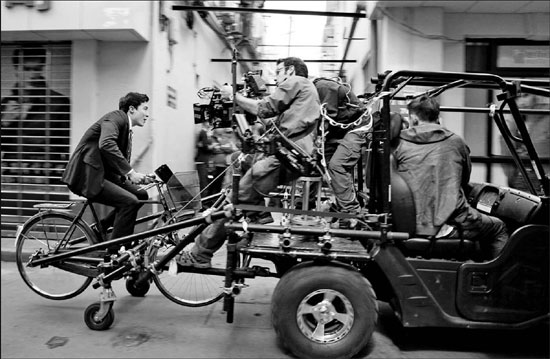The film health analogy
Here’s a thought experiment: could we compare the way we look after our health with the way that films are made? A film-making team has to be decisive, yet flexible. There is usually a strong core leader who co-ordinates the talents of more specialized technicians. These talents include writers, actors, set designers, sound recordists, musicians and, of course, camera operators.
For the sake of simplicity, let’s consider the camera department. There’s a DOP, the director of photography, who co-ordinates three divisions: 1) camera operators and assistants, who are responsible for the care and preparation of the camera and lenses, as well as the logging of any footage that is recorded; 2) gaffers and electricians, who are responsible for lighting any given scene and providing electricity for those lights; 3) grip team, who are responsible for mounting the camera on dollies and other devices, when a moving shot is required. The DOP works with the director to achieve a desired look for the film. The film needs to be stylish, but also shot in an efficient and timely manner. Artistic and practical concerns need to be balanced. It is essential that there be a managing intelligence that co-ordinates related tasks.
Are there similar divisions to health? For the sake of argument, here’s my list: 1) exercise; 2) diet; 3) check-up, testing and body repair. Other areas that might also be mentioned include having a positive attitude, cultivating good relationships with other people, and living in a clean and safe environment. To keep it simple, I’ll focus on the first three: diet, exercise and body repair. Are there knowledgable guides who can assist us in each of these areas? Yes, there are. For exercise, we might employ an fitness coach, a yoga instructor, or take classes at a gym. Or we might join with friends to form hockey leagues, bike clubs, and engage in swimming sessions of our own. Friends and specialists help motivate us and raise our level of activity and fitness. For diet, we might go a naturopath, or take cooking classes, or exchange information on healthy food with gardening friends or with venders at a market. For body-repair, we see a doctor or go to a clinic for tests and x-rays.
The question that follows, using my film analogy, is: who is the DOP of our health? Who is the guiding intelligence co-ordinating and directing the related needs of exercise, diet and body repair? The answer is ourselves. We are responsible for our own health and the health of our children. When I say this, I believe we still need coaches, we still need friends and motivators. We need to seek advice and educate ourselves with the best information available.
We tend to think of health, if we think of it at all, as having to do with doctors and hospitals. But these hardly cover the full spectrum of health. The spectrum they cover has to do with breakdown, an area none of us want. What we really want and need is optimal health and for this, we have to look for counsel and support outside of the medical field.
In conclusion: think of health as a film project and assemble a team to help you cover all the angles. What results is a film worth watching, a body that thrives on its own well being.
